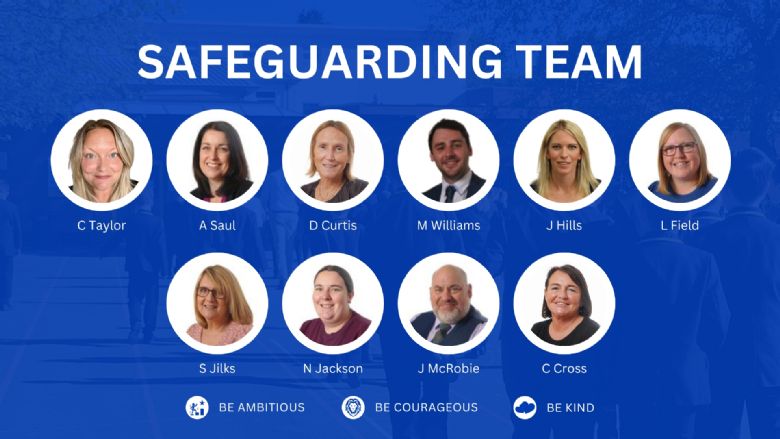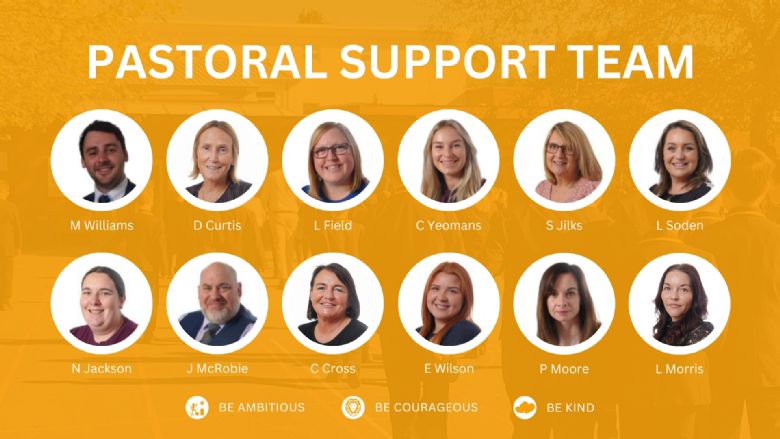Stay Safe for Team Ipsley Pupils
As Team Ipsley, we strive to create a community where all flourish, following God’s example by loving each other as He loves us. Together, we become the best versions of ourselves by being ambitious, courageous and kind, creating a community which can achieve anything we set our minds to.
Please let a member of staff know if you have any ideas about keeping our school happy, healthy & safe!
Who are the Safeguarding Team?

If you have any concerns/issues around safeguarding, you can talk to any members of staff or contact one of the above designated safeguarding lead(s) in school.
Who are the pupil support team?
The pupil support team is made up of a number of members of staff who all play a key role in supporting you throughout your time at Ipsley. At times, you may need support from different members of the team to ensure that you are happy, healthy and safe.

Child-friendly anti-bullying policy
The below section was written by our Happy, Healthy & Safe pupil team:
1. Cyberbullying
Cyberbullying is where people say unkind or hurtful things on social media, the internet or in a text message.
Cyberbullying is a very serious matter and can lead to you getting in trouble with the police!
What can you do?
- Don't retaliate (Often, that's what they want!)
- Save the evidence (Screenshot and/ore save the messages)
- Tell someone what's happening
- Report, block, get rid!
- Remember the problem is with them, not you
Don't forget that things you say, post or share online can be seen by lots of people.
2. Bullying
A bully is someone who purposely hurts another person more than once by using behaviour which is meant to hurt, frighten or upset another person.
Bullying can be:
- Spreading rumours
- Being called names

- Physical - hitting, kicking, punching etc.
- Repeatedly leaving someone out
- Cyberbullying - nasty messages etc.
- Making a fool of someone
But, it may not be bullying when two young people of a similar age and strength fight or fall out.
Do's & Don'ts:
- Do: Ignore them and walk away.
- Do: Ask them to stop.
- Do: Act as though you don’t care what they say or do.

- Do: Tell someone and get help straight away.
- Don’t: Get angry or fight back – try not to react.
- Don’t: Hit them.
- Don’t: Hide it.
- Don’t: Do as the bully says.
- Don’t: Think it’s your fault.
Remember: If you are bullied or know someone else is being bullied, then you must tell someone! Don't try and deal with the bully yourself.
You can tell:
- A teacher
- Your parent/carer
- A friend
- Your class teacher or form tutor
- Any member of staff at Ipsley
Members of staff at Ipsley will:
- Take you seriously
- Talk to everyone involved
- Help you feel safe at school
- Give sanctions to the bully
- Check up on you
- Provide anti-bullying awareness training
- Set clear rules for behaviour
- Contact parent/carers
- Provide positive role models
Wellbeing
Your mental wellbeing is about how you're feeling right now, and how well you react to challenges in daily life. Our wellbeing can change from moment to moment, day to day or month to month.
Sometimes it changes because things happen to us, and sometimes it changes for no reason at all. It can affect the way we feel about ourselves and others.
Having good wellbeing can help you to:
- Feel and express a range of emotions
- Have confidence and positive self-esteem
- Have good relationships with others
- Enjoy the world around you
- Deal with stress and adapt when things change
Good wellbeing doesn't mean you'll always be happy. It's normal to feel sad, angry or low sometimes.
What can affect my wellbeing? We're all different, so what affects your wellbeing may not be the same for somebody else. But common things are:
- The care and support you get at home and school
- Your relationships with the people around you
- Your physical health - how much sleep you get, what you eat and drink
- Difficult or stressful life events
- Being able to recognise and communicate your emotions
You may experience difficulties in some or all of these areas, but that's okay. Everyone is different.
My stress bucket
We all experience stress in our lives (and that is normal) but it can be difficult if we don't know how to manage this stress.
So, what can you do to help each other and yourselves?
- Talk to someone that you trust
- Exercise, go for a walk, eat well and make healthy snacks
- Have fun, spend time with friends and family (in person if it's an option)
- Find a hobby, play your favourite sport or watch a film
- Relax and sleep well
- Be kind and help others
- Try and remember it's always ok to ask for help
If you can do some of these things, you will feel calmer, think clearer and feel better!
The middle school brain
You are marching towards being an adult - but not quite there yet...
Brain facts:
- Your middle school brain is having a party - it's a time of rapid growth and changes for your brain
- Your brain is packed full of hormones which are working super hard to grow your body! You may feel some big emotions and that's okay
- It is very normal to feel emotional, angry and excited and sometimes it's all just too much - that's when you need to talk to someone you trust and get some help
- The parts of your brain will not grow as well if they are not being used - use your brain every day!
- The more you use your brain during this time, the stronger it will be
- You will need more sleep
- Your brain is working at it's best between 10:00AM and 14:00PM - these middle school years are a golden time for learning
Self-care plans
The summer holidays are an exciting time for our pupils, but for some, losing the structure of school can be a worry. Self-care is all about what you can do to help yourself feel better or to keep yourself feeling good. It’s a way that we can look after our own mental health and wellbeing. It can help your body and mind to relax, drift away, or be more energised.
These self-care plans walk primary and secondary-aged children through a series of steps, helping them create a simple self-care plan that works for them. It helps children identify activities that they can use to support their mental health.
Useful websites & information
1. CEOP
Website: CEOP
Are you worried about online sexual abuse or the way someone has been communicating with you online? Make a report to one of CEOP’s Child Protection Advisors here.
2. Childline
Website: Childline
Childline is here to help anyone under 19 in the UK with any issue they’re going through. You can talk about anything. Whether it’s something big or small, our trained counsellors are here to support you.
Childline is free, confidential and available any time, day or night. You can talk to us:
- By calling 0800 1111
- By email
- Through 1-2-1 counsellor chat
Whatever feels best for you.
3. CyberSprinters
Website: CyberSprinters
Interested in learning more about staying safe online, and developing your own coding and skills in the process?
Play CyberSprinters here! And don’t forget to check out the rest of the National Cyber Security Centre website for more opportunities, games and competitions.
4. Mind
Website: Information for young people on mental health & wellbeing
If you're going through a difficult time or are struggling with how you're feeling, it can be really scary and upsetting.
Whatever you're feeling right now, we're here for you. We have information and advice so you don't have to go through it alone.
5. CAMHS
Website: Child and Adolescent Mental Health Services
CAMHS stands for Child and Adolescent Mental Health Services.
CAMHS is the name for the NHS services that assess and treat young people with emotional, behavioural or mental health difficulties.
CAMHS support covers depression, problems with food and eating, self-harm, abuse, violence or anger, bipolar disorder, schizophrenia and anxiety, among other difficulties.
There are local NHS CAMHS services around the UK, with teams made up of nurses, therapists, psychologists, child and adolescent psychiatrists (medical doctors specialising in mental health), support workers and social workers, as well as other professionals.
6. SHORE
Website: Shore
Are you worried about your own or someone else’s sexual thoughts, feelings or actions? We can help.
Shore has anonymous advice and support to help you or someone you know manage worrying thoughts and learn more about living safely both online and offline.
All our services are anonymous, which means you don’t have to say who you are.

